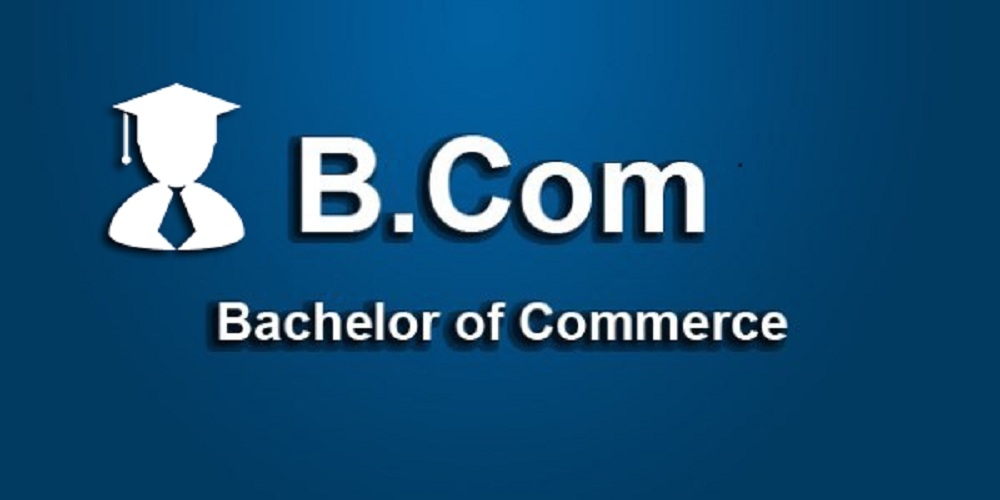B.Com Course: Eligibility, Syllabus, Career Options, Top Colleges & Scope

The B.Com course, short for Bachelor of Commerce, is one of the most sought-after undergraduate programs for students from the commerce stream. It opens the door to multiple career opportunities in finance, banking, taxation, accounting, business, and entrepreneurship. In this comprehensive guide, we’ll explore everything about the B.Com course—from its eligibility and admission process to subjects, career options, and future prospects.
Why Choose the B.Com Course?

Here are a few strong reasons why lakhs of students opt for the B.Com course every year:
✔️ Wide range of career options in both private and public sectors.
✔️ A perfect foundation for professional courses like CA, CS, CMA, CFA, and MBA.
✔️ Opportunity to explore multiple domains like banking, insurance, and analytics.
✔️ Affordable fee structure and availability across top universities.
B.Com Eligibility Criteria

To apply for a B.Com course, students must fulfill the following basic criteria:
✅ Must have passed 10+2 from a recognized board.
✅ Commerce stream is preferred (Accounts, Business Studies, Economics).
✅ Minimum percentage (usually 50-60%) varies by college/university.
✅ Some universities conduct entrance exams for B.Com admissions.
B.Com Admission Process (2025)

Admission into a B.Com course can be merit-based or entrance-based. Here’s how it usually works:
Merit-Based Admission:
Marks obtained in Class 12th are considered.
Cut-offs for B.Com courses in top colleges can be high (85–95%).
Students apply through the university’s centralized portal (like DU, GGSIPU, etc.).
Entrance-Based Admission:
Some universities (like GGSIPU, NMIMS, BHU) conduct entrance exams.
Based on rank/score, seats are allotted during counseling.
Subjects in B.Com Course

The B.Com syllabus is vast and covers all major aspects of commerce and business. Here’s a year-wise overview:
✅ Year 1:
Financial Accounting
Business Law
Business Organization
Principles of Management
Business Communication
✅ Year 2:
Corporate Accounting
Cost Accounting
Income Tax Law and Practice
Business Economics
Company Law
✅ Year 3:
Auditing
Banking and Insurance
Financial Management
E-Commerce
Entrepreneurship Development
The B.Com course also includes internal assessments, project work, and seminars.
B.Com Specializations

Some universities offer B.Com courses with specializations to help students focus on a specific area. Popular specializations include:
B.Com (Accounting & Finance)
B.Com (Banking & Insurance)
B.Com (Taxation)
B.Com (Computer Applications)
B.Com (International Business)
These specialized B.Com courses enhance career-specific knowledge and job prospects.
Career Opportunities After B.Com

Completing a B.Com course opens up a wide range of career opportunities across various sectors. One of the most common roles for B.Com graduates is that of an Accountant, where they can begin their journey as junior accountants in private companies, startups, or CA firms. Another in-demand career path is becoming a Tax Consultant, helping individuals and businesses with tax planning, filing returns, and ensuring compliance with tax laws.
For those interested in the banking sector, Banking Jobs in both government and private banks are a promising option. Students can appear for competitive exams like IBPS, SBI PO, or RBI Grade B to secure a stable and well-paying job. Additionally, Financial Analyst roles are available in investment firms, insurance companies, and corporate finance departments, where B.Com graduates analyze financial data and assist in decision-making processes.
Another important role is that of an Auditor, where professionals examine financial records to ensure accuracy and legal compliance. This role is essential in maintaining financial transparency in organizations. Those interested in the insurance sector can work as an Insurance Advisor, selling policies and assisting customers with claims in companies like LIC, ICICI Prudential, or HDFC Life.
Overall, the B.Com course equips students with practical knowledge and strong analytical skills, preparing them to take on real-world business and financial challenges effectively. With the right skillset and experience, B.Com graduates can find excellent growth opportunities in both the public and private sectors.
Higher Education Options After B.Com

Many students pursue higher education after completing the B.Com course. Here are popular options:
Master of Commerce (M.Com
After completing a course, many students choose to pursue higher education to gain specialized knowledge and enhance their career prospects. One of the most common options is the Master of Commerce (M.Com), which is a two-year postgraduate program that offers in-depth learning in areas like finance, accounting, taxation, and economics. It is ideal for students aiming for academic or research roles or planning to clear UGC NET for lectureship.
MBA (Master of Business Administration)
Another popular path is pursuing an MBA (Master of Business Administration). The MBA is highly valued in the corporate world and offers various specializations such as finance, marketing, human resources, international business, and operations. A B.Com graduate with an MBA can explore managerial positions in MNCs, banks, and startups. Preparing for exams like CAT, MAT, or XAT is essential for admission into top MBA colleges.
CA (Chartered Accountancy)
For students inclined toward professional courses, Chartered Accountancy (CA) is a prestigious option. The course is governed by the ICAI and focuses on accounting, auditing, taxation, and financial reporting. Many students begin their CA journey during the course to save time. Similarly, students can opt for Company Secretary (CS), Cost and Management Accountancy (CMA), or Chartered Financial Analyst (CFA), each catering to specific roles in corporate governance, costing, and financial analysis.
CFA, CS, CMA
Global certification courses such as ACCA (Association of Chartered Certified Accountants) and CPA (Certified Public Accountant) also attract graduates who want to work abroad or in multinational corporations. These courses provide international recognition and open doors to global job opportunities.
In summary, it acts as a versatile foundation for multiple higher education paths. Whether you wish to continue academics, enter the corporate world, or pursue professional certifications, it offers the flexibility and scope to follow the route best suited to your interests and career goals.
B.Com Distance Education & Online Learning
With the growth of EdTech, students can now pursue the B.Com course online or in distance mode from universities like:
IGNOU
Amity Online
Chandigarh University Online
Jain Online
The online B.Com course is UGC-approved and suitable for working professionals or those preparing for competitive exams.
Average Salary After B.Com

The salary after a B.Com course depends on job role, industry, and skillset. Here’s a general idea:
| Job Role | Average Salary (INR per annum) |
|---|---|
| Accountant | ₹2.5 – ₹4 LPA |
| Tax Consultant | ₹3 – ₹5 LPA |
| Bank PO/Clerk | ₹4 – ₹6 LPA |
| Financial Analyst | ₹4 – ₹7 LPA |
| Auditor | ₹3.5 – ₹6 LPA |
With 2–3 years of experience and certifications, B.Com graduates can earn even more.
Top Colleges for B.Com in India
If you’re planning to apply for a B.Com course, here are some top-ranked colleges:
Shri Ram College of Commerce (SRCC), Delhi University
Christ University, Bangalore
Hindu College, DU
Loyola College, Chennai
Symbiosis College of Arts & Commerce, Pune
GGSIPU Colleges: Maharaja Agrasen Institute, VIPS, JIMS
Admission into these colleges for the B.Com course is competitive and based on cut-offs or entrance tests.
Skills Required for B.Com Students

To succeed in the B.Com course and beyond, students must develop the following skills:
Analytical thinking
Numerical ability
Communication skills
Business awareness
Technical tools like MS Excel, Tally, etc.
The B.Com course is not just about theory—it also emphasizes practical learning and internships.
Future Scope of B.Com Course

The scope of the B.Com course in India and abroad is vast:
Steady demand in sectors like banking, finance, insurance, taxation, and consulting.
High demand for skilled B.Com graduates in fintech, accounting software, startups, and corporates.
Opportunity to go global with certifications like CPA, ACCA, or CFA after your B.Com course.
Final Thoughts
The B.Com course is a powerful platform for students who aim to build a solid career in commerce and finance. With multiple specialization options, job opportunities, and scope for higher education, B.Com remains a top choice after 12th commerce.
Whether you aim to become a CA, work in MNCs, or start your own business, the B.Com course can be the stepping stone to your success.
Frequently Asked Questions (FAQs)
Q1. Is B.Com a good course after 12th commerce?
Yes, the B.Com course offers great career prospects and higher education opportunities in finance, business, and government jobs.
Q2. What is the duration of the B.Com course?
The B.Com course is a 3-year undergraduate program.
Q3. Can I do MBA after B.Com?
Absolutely! The B.Com course is the ideal foundation for pursuing an MBA in finance, marketing, HR, or international business.
Q4. Which is better: B.Com or BBA?
If you are interested in finance and accounting, go for B.Com. If you prefer management and leadership, BBA is the better option.

